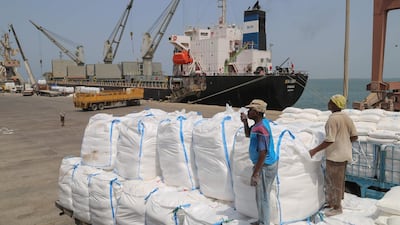The UAE has redeployed troops in Yemen as it seeks to move from a military outlook to a focus on the peace process, after partial successes of a political agreement for the port city of Hodeidah late last year.
"We do have troop levels that are down for reasons that are strategic in Hodeidah and reasons that are tactical" elsewhere in the country, a senior UAE official said on Monday.
"It is very much to do with moving from what I would call a military-first strategy to a peace-first strategy."
The official said the move was in co-ordination with other coalition allies supporting the internationally recognised government of President Abdrabu Mansur Hadi.
He said there was little concern of a power vacuum because the UAE had supported, supplied and trained 90,000 Yemeni government fighters who “fought with valour and distinction”.
The official declined to discuss the details of the redeployment because of ongoing military engagement, but he said troop numbers were “definitely down” and equipment had been moved.
The official said that while the decision was not because of increased tensions with Iran, the regional situation could not be ignored.
“We are very much putting all our eggs in the basket of the Stockholm agreement,” the official said.
He was referring to the deal reached at UN-backed talks in December 2018 for rebel and government forces to pull back from the vital port city of Hodeidah.
The official said the government was focused on ensuring all residents of the UAE were safe after several tankers were attacked in the Gulf of Oman.
With existing defences – from troop levels to Patriot and Thaad missile-defence systems and continuous dialogue with allies – the country was well-protected from missile and drone attacks and other threats, the official said.
The current Iran tensions are concerning but the UAE “is not trigger happy” and is seeking to de-escalate the situation as much as possible.
The UAE wants Iran to moderate its behaviour before there can be substantive talks, but is also clear that there must be regional voices in any new discussions, as a major problem with the 2015 nuclear deal had been the lack of local participation.
“Jumping from the current abyss to talks is a fallacy, propagandist at best," the official said. "We don’t reject talks but there needs to be the right soil."
Critical to any future discussions will be a long-term solution to Iran’s regional interference and its nuclear enrichment.
Tension with Iran has increased in recent months after Tehran said it would stop complying with the 2015 nuclear agreement.
Its announcement was made a year after the US pulled out of the deal and imposed strict sanctions on Tehran.
The official said that in Yemen, the UAE had achieved many key objectives.
More territory had been liberated than was held by the Houthis, he said, and the rebels were not expanding their area of control.
The government of Yemen is secure and has improved capacity and the UAE helped to undermine Al Qaeda’s operations and control in the country, eroding their ability to stage global attacks or be a “premier” terror franchise.
Maritime traffic in the area around Bab El Mandeb is secure and Iran's influence in the country has been challenged.
Also key were the many humanitarian successes, despite the scale of suffering caused by the five-year conflict.
The UAE provided $5.59 billion (Dh20.53bn) in aid to Yemen between April 2015 and June 2019, assisting 17.2 million Yemenis in every governorate of the country – including Houthi heartlands such as Saada.
More than $550 million had been spent on aid operations in Hodeidah governorate, with most going to emergency food assistance.
The UN has said that Yemen is the world’s worst humanitarian disaster, with millions on the brink of famine and deadly illnesses such as cholera resurgent.


